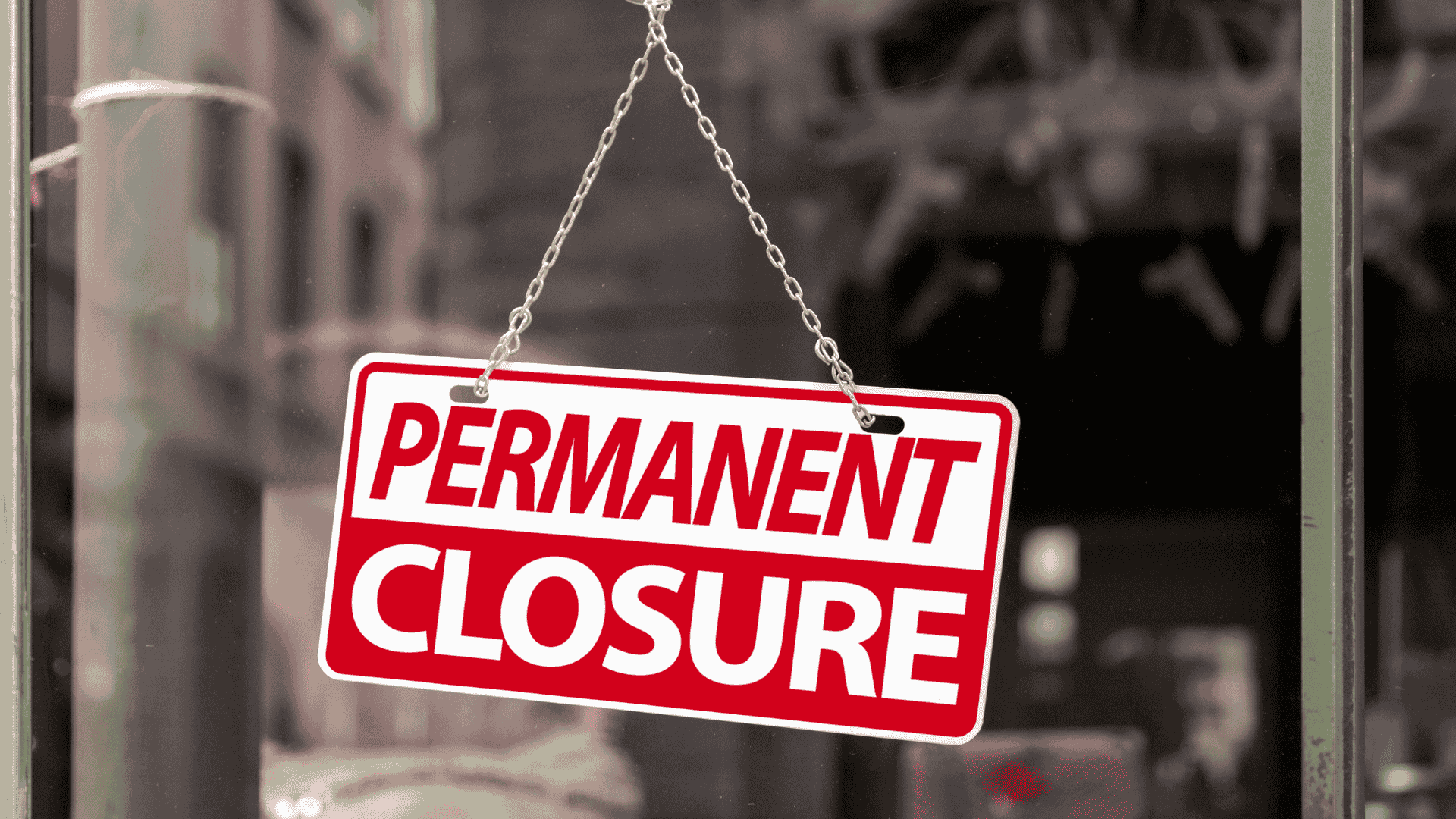It is crucial for any restaurant owner to learn why restaurants fail and ensure they don’t repeat the same mistakes. This can set you up for long-term success in hospitality.
A business owner needs to thoroughly review the reasons a restaurant could fail and create long-term solutions for their brand, to avoid falling victim to them.
So, here are 10 common reasons why restaurants fail, and how you can avoid them.
10 reasons why restaurants fail (and how to avoid them)
Simply knowing why restaurants fail isn't enough. You also need to understand the best solutions to these problems for your business. That’s why we’ve included the best pre-emptive actions for each common cause of restaurant failure.
1. Lack of concept and vision
According to a study by Cornell University, a restaurant's concept and vision are the core principles needed for long-term success. Without them, many businesses fail.
Core vision and concept are the main ways you can stand out from competitors, keep your values and mission aligned, and keep your team on track. If you have multiple venues, concept and vision are even more important, as they help you retain your brand identity and service standards across each location.
Vision and concept aren’t just a part of your brand though, these principles ensure shared goals throughout your team. With a clear vision, you can create an organisational culture that fosters success and improves performance.
If your restaurant's concept and vision are not clearly communicated across your entire staff, your team may take operations in the wrong direction, or lose aspects of your venue that appeal to your core market.
By being unclear with your vision or abandoning your reasons for starting the business, you may suffer from ‘mission drift’. This means you lose sight of your core reasons for success. As a result, you may end up constantly shifting between concepts that don’t work, affecting your brand's reputation with customers.
The Solution:
Your vision and concept must be communicated consistently internally and in your restaurant's branding. The best way to do this is through a mission statement.
A restaurant mission statement helps to communicate things like:
- Target audience: Who are you serving and what their needs are.
- Brand offer: What you are offering that is unique to your brand, and what your brand's core values are.
- Restaurant culture: The deeper significance of your restaurant's values, such as sustainable food practices, sharing cultural heritage, or supporting local community.
![]()
Mission statements can be communicated internally and externally to clearly define your business.
You and your team can refer back to this when making decisions or communicating with customers, to ensure that everything you do relates to your goals. Customers value authenticity, and remaining aligned and consistently committed to your values is the easiest way to show them that you are a restaurant worthy of their patronage.
2. Ownership size and insufficient funding
Cornell University’s study found a strong link between failed restaurants and ownership size. The larger the firm owning a restaurant, the more likely it is to survive, due to the extra resources and backup revenue that can be used to offset slow periods.
Suppliers and bankers are also likely to take longer to act against large owner groups because of the added financial safety and security they provide. This naturally helps restaurants survive for longer.
Don’t be disheartened; not all restaurants need to be owned by a large corporate conglomerate to succeed. Restaurant businesses with smaller ownership groups just need to ensure they have proper funding and make clear, solid financial decisions for steady growth. While there may be a greater risk of financial stress, a smaller enterprise can still succeed as a brand.
The Solution:
With sufficient funding, even a smaller enterprise can ensure consistent success and stable growth. If your restaurant is not owned by a larger firm, funding can be secured through a business loan, friends and family, a private investor or even crowdfunding.
By streamlining operations and ensuring funding is put where it will increase profits, a smaller restaurant can thrive. For more information, check out our guides to getting funding for restaurants and sustainably growing a restaurant business.
3. Lack of planning and experience
The study also found that inadequate planning and lack of experience in the industry are a common cause of restaurant failure. Without experience in the hospitality industry, new owners commit common mistakes, and without proper planning, operational efficiency is severely affected.
The industry is constantly changing, and someone who has worked in hospitality previously, whether as a server, kitchen staff, general manager, or otherwise, is more accustomed to the challenges that arise. Therefore, they can see these changes coming and know how to plan accordingly, making them ideal restaurant owners. A new owner who has no previous hospitality expertise must be willing to learn common pitfalls and issues and which contingencies they should have in place as soon as possible.
The Solution:
Your restaurant should prioritise restaurant forecasts, mission statements, and sample menus to effectively plan for success.
Above all, a comprehensive restaurant business plan can help you avoid the pitfalls of poor planning and ensure you have a clear roadmap to follow as you navigate the early stages of running a restaurant business. Following a business plan makes it easier to plot your progress and identify when you stray too far from your initial predictions or intentions. Having this guidance is essential for the success of any new endeavour.
If you have no experience with running a restaurant business, you should try to involve people with relevant expertise in your business. This can include staff members and business partners who can share their knowledge and support you. Remember, the strength of a team (and your restaurant!) is each individual member. This will help to ensure your restaurant's success.

4. Legal compliance
According to a paper in the International Journal of Hospitality & Tourism, there is a significant correlation between health code violations and restaurant failure. Failure to meet proper legal requirements will rack up costly fines, affect your brand's public reputation, and could even lead to closure. A reputation for poor hygiene will also turn off potential customers and regular patrons.
Failing to meet legal compliance can also indicate other issues in your restaurant, such as poor operations, miscommunications and bad inventory management. The International Journal of Hospitality & Tourism article notes that a restaurant should use a health inspector's visit as an opportunity to assess their efficiency and risk factors and implement positive improvements.
The Solution:
As a business owner, you must stay up to date with all health and safety requirements in your jurisdiction. With quality compliance apps like Trail, you can ensure you and your entire staff can use clear and comprehensive checklists to cover the crucial tasks and safety standards your restaurant has to follow. These digital checklists provide accurate time and date stamped records of your due diligence that you can show your health inspector when they visit.
The article also found that, when attempting to reduce labour costs, many restaurants actually ended up with more health and hygiene violations. It also found that restaurants facing financial stress often committed the most health code violations.
You must always ensure your business finds ways to prioritise health and safety, even during difficult periods. If you are looking to minimise labour costs, then implementing a streamlined software system is the best way to do it without things getting overlooked and standards slipping. ResDiary’s table management system automates booking management and integrates with over 70 systems, like EPOS software and rota management tools that optimise and digitise tedious manual tasks for you.
For more information on legal compliance, check out our complete guides to the essential licences to open a restaurant in Australia and the legal requirements to open a restaurant in the UK.
5. Location and points of difference
Location is an extremely important factor in any restaurant's success or failure. A restaurant is likely to fail if there is too much competition nearby or if the restaurant is too difficult to reach for its target market.
Being in close proximity to other restaurants can be a double-edged sword. While you can use marketing and specials to ‘steal’ business from rival restaurants, those same restaurants can take advantage of the same methods to steal from you, too.
When you are researching what location to establish your restaurant in, it’s important to consider whether your target market is there, too. If there aren’t any other hospitality businesses in that area, there might be a good reason for it. Or, you might be the trailblazer in finding the perfect new spot.
While the location itself is important, the appeal of your restaurant may vary depending on external factors as well. A restaurant near the sea may do better in summer than in winter, for example. If a business owner doesn't take advantage of seasons and events, their venue may steadily lose revenue over a long period of time.
The Solution:
To succeed in competitive locations, your venue must have appealing points of difference compared to local competition. This can include better customer service, clearer vision and brand concept or unique events to encourage repeat bookings.
Some points of difference, or unique selling points (USPs), can be:
- A signature cuisine in comparison to the restaurants around you. If there are Italian, Indian, and Chinese restaurants nearby, you could establish your venue as the destination for Mexican cuisine, or authentic Peruvian-Japanese fusion. If there are lots of pizza places nearby, stand out as the go-to burger joint.
- A diet-conscious option. The market around you might be saturated with fast-food options and you could branch into vegan, keto, gluten-free, or allergy-friendly menus if this aligns with your brand missions and target market.
- Late night opening times. You could stand out in your location by offering late hours and becoming the go-to spot after hours. If cinemas, bars, or clubs are nearby, then this could be a profitable option for the party-goers and night owls.
- Sustainability focus. Why not invest in your sustainability efforts like compostable packaging, zero waste, or carbon neutral ambitions? City-centre venues can often benefit from capitalising on the environmentally conscious generation of young people in the city.
- Events, interactive elements, or immersive experiences that no-one offers nearby. You could consider activities like DIY pizza, sushi rolling, or cocktail making at the table, live music, or themed nights.
According to ResDiary’s Beyond the Booking report, many restaurateurs recognise the value of events. 48% of UK respondents are considering running more events in 2025, and 42% say they will do so.
You can rely on ResDiary to help you run more events. For example, you can use our promotions feature to get the word out about events in your business via booking widgets and your marketing channels. Our advanced table management software helps you process event bookings more smoothly.

Getting the most out of events can also involve venue expansion. A venue with a rooftop bar will be much more desirable for certain customers, giving your business a strong seasonal boost.
If your venue hasn’t opened up any outdoor areas, you could be losing diners in the warmer months. See our ultimate guide to summer for hospitality venues for more ways to maximise seasonal revenue. 
6. Poor food and service
The success of your restaurant hinges on the quality of your food and service. Ultimately, that’s what customers are looking for in your business. If a restaurant has poor food quality and bad service, bad word of mouth and online reviews can halt your growth.
In the UK and Ireland, over 22% of customers look at a restaurant’s reviews before they place a booking, according to our Beyond the Booking respondents.
Food is a primary reason customers visit a restaurant, but poor service can also contribute to a lack of repeat visits and bad word of mouth. In addition, poor service can lead to a downward spiral of inefficiencies as bottlenecks pile up.
The Solution:
Ensure you are reacting to feedback on your food and services. You should immediately and efficiently address any complaints or feedback about food or services.
You should also reach out to customers to request reviews and gather unbiased feedback: the more the merrier. This can easily be accomplished with automated post-dining follow-ups with ResDiary’s built-in email marketing. You can’t improve if you haven’t identified the issue, so be proactive and put yourself ahead.
Staff training is also important in ensuring your team aren’t contributing to any perceptions of bad service. Regularly train your team on your business values, customer service expectations, and health and safety requirements.
Services can also be greatly improved with quality management software. With ResDiary’s table management software, you can reduce bottlenecks and inefficiencies while automating essential processes. By ditching your pen-and-paper diary, you can spend less time on admin tasks and more time on providing quality service for your diners.
7. Marketing
A restaurant not being able to reach its customers due to poor marketing is another common reason for failure. If you can’t attract diners to your restaurant, your restaurant can’t thrive. With successful marketing, a brand can ensure they have a steady stream of appropriate patrons and are consistently growing.
A complete marketing strategy is critical for reaching your target market and attracting both new and returning customers. If you are not adapting your marketing to current trends and the tastes of your target audience, you are missing out on crucial business. This opens the door for competitors to take your revenue.
Marketing is a constantly changing field, and failing to update your approach can harm your restaurant’s growth. It’s important to consider how big your campaign needs to be, where your target market is located and what platforms they use the most.
The Solution:
Ensure you know your target market well to avoid marketing mistakes, and then implement the tools to reach them. With ResDiary’s built in marketing features and quality integrations, your business has easily accessible tools for effective marketing.
ResDiary’s email marketing not only allows you to automatically create and send booking confirmations and, follow-up messages, but you can directly engage your customers with promotions and marketing offers. You can also use our Silverstreet integration to reach customers on SMS, too. ResDiary integrations also allow customers to book with you directly through Reserve with Google as well as Facebook and Instagram, so if you’re marketing to diners through search ads or social media, the journey from seeing your ad to making a booking is streamlined and speedy.

ResDiary’s marketing tools and integrations are an efficient, cost-effective way to attract more customers to your business. You can also take advantage of two-way data flow with ResDiary to put your booking data to use in your campaigns.
Read our complete guide on digital marketing for restaurants to discover more ways to reach your customers and attract diners.
8. Inefficiencies
Constantly losing revenue due to inefficient operations, poor booking systems, and disorganised staff could eventually cause a restaurant to fail. By streamlining operations and communication, you can ensure your venue is not bleeding money and has time to focus on the most important tasks.
Inefficiencies can also include administration systems. With a pen and paper booking system, staff and management will have to spend time looking for a physical book. Then, they’ll need to dig through bookings to find the right reservation. Using spreadsheets and paper records can also make it harder to take booking notes and facilitate communication between management and staff.
The Solution:
Quality table management systems like ResDiary can help you streamline your daily operations and move away from ineffective analogue booking systems. An online table management system also lets you set smart rules for easy booking management, automatically controlling the flow of bookings.
For more information about how much pen and paper systems could cost your business, check out our ResDiary value calculator.
9. Bad financial management
Bad financial management can come in many forms. You might invest too much in unpopular products, overspend on staff, or attempt to expand your restaurant too quickly.
This often goes hand-in-hand with not having the proper experience or planning to run a restaurant. It’s crucial to have the appropriate planning in place, and tools to stay firmly on top of your business’ finances.
The Solution:
Ensure your brand has a clear business plan. You should also rely on tools like restaurant forecasts to ensure your business is turning a profit (or heading in that direction).
You should also pick clear key performance indicators (KPIs), like sales or gross profit. Closely track these KPIs to elevate your financial management and help you make decisions.
You should completely review your restaurant finances, from labour payments to food costs, at regular periods. This will help you understand where your biggest profits come from, and where you may be spending too much. This will also allow you to calculate return on investment in your restaurant.
10. Failure to adapt
The hospitality industry is constantly changing, from price fluctuations, to new regulations, to constant trend cycles. A business that does not adapt will be left behind by its competitors.
The changes that a restaurant needs to adapt to encompass many different aspects of the business. This includes everything from marketing to tech innovations to menu trends.
It is important to track the changes your immediate competitors are making. You should also keep an eye on the industry more broadly. Even the latest social media dining trend could present a major struggle or opportunity for your business.
The Solution:
Stay fluid in your strategy and ensure your restaurant is capable of handling marketing and tech changes. You should also find the best resources to keep you informed of trends and innovations in the industry.
ResDiary’s annual Beyond The Booking reports showcase the major changes in the industry and help businesses adapt to new trends and innovations. These can be key to setting your business up for success.
How to protect your restaurant business from failure
Here are some of the key ways to protect your business from failure:
- Finance management: Your business needs adequate funding and financial management to cope with the changes that your restaurant may experience. You must ensure you are making a profit from your services, or are at least trending in this direction. ResDiary can help out with a commission-free booking solution that keeps more money in your pocket.
- Effective tech tools: By streamlining every aspect of your business, you can reduce inefficiencies and daily costs. With ResDiary, you have an effective solution to streamline your business without digging into your profits. With ResDiary’s integrations, you can create an efficient tech stack promoting two-way data flow. This helps you get the best value from your integrated systems, from marketing to EPOS solutions.
- Clear planning: To be a good restaurant manager you will need to be prepared for dozens of eventualities. Create plans for steady or rapid growth. You should also plan events and specials to attract customers in slow seasons. Regularly review your sales, and create restaurant forecasts to update your plans.
- Unified mission statement: A restaurant needs a unified vision and concept to stand out among competitors. This also helps to unify both the staff and customers on what is unique to your brand. If there are senior role changes in your business, there will be less ‘mission drift’, or leadership issues that could negatively affect your venue.
How to protect your restaurant business from failure
You can rely on ResDiary to give you the solutions you need to avoid the most costly mistakes a restaurant can make. We offer the tools you need to stay ahead of the industry's changes and showcase the things that make your brand unique.Our booking management system optimises your restaurant's management to streamline your daily operations. Taking care of things like marketing becomes simplified with our branded emails solution and array of integrations.
Book a demo with ResDiary and set your business up for success.





